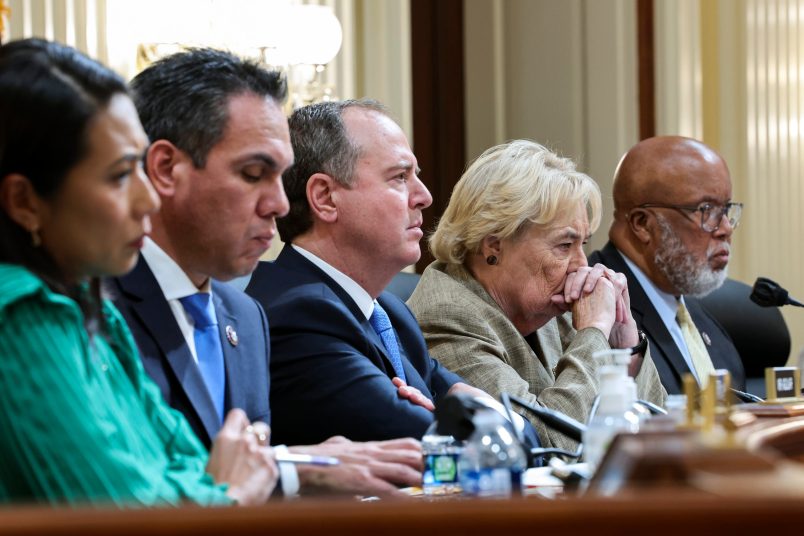After the Justice Department pressed the congressional Jan. 6 Committee to provide all of its deposition records for ongoing federal criminal cases, members of the committee said that while they wouldn’t be an obstacle to the DOJ’s work, they also had to focus on their own investigation and wanted federal prosecutors to be more specific in their request.
“We certainly will help them,” Rep. Adam Schiff (D-CA), a member of the committee, said on CNN Sunday.
But, Schiff added, “We want them to particularize what they’re asking for.”
The bubbling tension between federal prosecutors and congressional investigators became public record Thursday, when prosecutors disclosed a letter sent the day prior from the DOJ to the committee. The letter was included in a court filing in the criminal prosecution of several members of the Proud Boys charged in the Capitol attack.
The letter followed up on a request from April, and stated that it was critical that the committee provide “transcripts of all of its witness interviews.”
“The Select Committee’s failure to grant the Department access to these transcripts complicates the Department’s ability to investigate and prosecute those who engaged in criminal conduct in relation to the January 6 attack on the Capitol,” the Justice Department officials wrote to the committee.
Several members of the committee have said they’re willing to work with the DOJ, but not by handing everything over to the executive branch.
“We are not going to stop what we are doing to share the information that we’ve gotten so far with the Department of Justice,” committee Chair Bennie Thompson (D-MS) told reporters Thursday. “We have to do our work.”
In his appearance on CNN’s “State of the Union” Sunday, Schiff pushed back on the idea that the DOJ should expect “all” of the committee’s deposition transcripts, which now number in the hundreds.
“Congress never says, ‘Hey, Justice Department, other branch of government, just come and go through our files.’ We also don’t say, ‘Hey, we want to go over and just rifle through your files,’” he said.
“When the Justice Department asks for things specifically — ‘Hey, we’re looking at a case, we’re investigating this person, can you give us what you have’ — we work with them. And we will work with them here.”
Prosecutors, Schiff added, have subpoena power too, and can convene grand juries and bring in witnesses.
“Traditionally, they don’t wait for Congress to do that work for the department,” Schiff said. “So we’re going to work with them. We want them to be successful in bringing people to justice.”
Other members of the committee have expressed an eagerness to help prosecutors, but noted that the panel staff is currently inundated with work themselves.
“We were surprised by that, frankly, and we will engage,” Rep. Zoe Lofgren (D-CA) said of the recent DOJ letter on CBS’ “Face the Nation” Sunday.
“We’re not going to be an obstacle to the Department of Justice prosecution of individuals,” she added. “We’re in the middle of putting these hearings together. The staff is working incredibly hard along with the members of Congress. We will get particular information that they need over to them in an orderly way, certainly by the beginning of next month.”
But a couple days earlier, Lofgren was a bit less diplomatic in an interview with CNN’s Jake Tapper: “It’s really not the way that DOJ is supposed to work,” she said of the DOJ’s blanket request for transcripts. “What have they been doing over there?” the congresswoman added.
“We’re certainly going to be engaged with them and provide necessary transcripts and information that might be necessary, but you don’t have the executive branch tromping into the legislative branch and essentially turning our investigation upside down,” Lofgren told Tapper. “That’s not the way things have proceeded. But we will engage with the DOJ. We will provide what’s necessary in an orderly way.”



